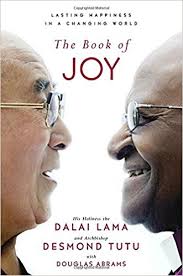One question I ask on the Team Member Fact Sheet is: If you could have dinner with anyone, past or present, who would you select and what question would you ask them? When I answer this, George Washington comes to mind and the thing I would ask him is: What part of what you put in place when this country was formed do you hope is still there in 200 years?
When I was handed The Book of Joy, it was not on my personal bucket list to go into a room with Bishop Desmond Tutu and the Dalai Lama to ask questions and listen to them share their stories and collective wisdom for a week. As I read the last page, I felt like I had been part of a very special event – and I had a book with pages dog-eared around all the thoughts I collected during the journey. I liked this book, and as you head into a gift-giving time of year, it is worth putting on your list.
Instead of writing a review, let me just share some of the thoughts I highlighted from those dog-eared pages and let the thoughts and wisdom stand on their own for a little while:
- So when you look at the same event from a wider perspective, we will reduce the worrying and our own suffering. ~ Dalai Lama (p. 37)
- A study (by Brickman, Coates, Janoff-Bulman) found that lottery winners were not significantly happier than those paralyzed by an accident.
- Courage: Is not the absence of fear but the triumph over it. ~ Nelson Mandela (p. 94)
- Courage: Is not the absence of fear, but the ability to act despite it. ~ Desmond Tutu (p. 94)
- Studies have shown that sadness lasts longer than fear or anger. Fear lasts 30 minutes, sadness 120 hours. (p. 110)
- Sadness seems to cause us to reach out to others. We don’t get really close to others if our relationship is made up of unending hunkydory-ness. It is the hard times, the painful times, the sadness and grief that knit us more closely together. (p. 110)
- Without love, there is not grief . . . when we feel our grief, uncomfortable and aching as it might be, it is actually a reminder of the beauty of that love, now lost. ~ Gordon Wheeler (psychologist) (p. 113)
- Hope requires faith – even if that faith is in nothing more than human nature or the very persistence of life to find a way. Hope is nurtured by relationships, by community. Despair sends us inward. Hope sends us into the arms of others. (p. 123)
- Mudita is the Buddhist concept often translated as “sympathetic joy” and described as the antidote to envy. It is considered one of the Four Immeasurables, qualities we can cultivate infinitely. The other three are loving-kindness, compassion, and equanimity. (p. 140)
- A quote from a Tibetan imprisoned by the Chinese (and tortured) for 18 years. He told me he was in danger of losing his compassion for his Chinese guards. ~ Dalai Lama (p. 156)
- The real secret of freedom may simply be extending this brief space between stimulus and response. Meditation seems to elongate this pause and help expand our ability to choose our response. (p. 180)
- Marriages, even the best ones – perhaps especially the best ones – are an ongoing process of spoken and unspoken forgiveness. (p. 181)
- Research has identified key influences on happiness. One being our perspective towards life, or our ability to reframe our situation more positively. (p. 199)
- So many people seem to struggle with being kind to themselves ~ Dalai Lama (p.212)
- Why be unhappy about something if it can be remedied? And what is the use of being unhappy if it cannot be remedied? ~ Dalai Lama
- Forgiveness is the only way to heal ourselves and to be free from the past. ~ Desmond Tutu (p. 230)
- We stand firm against the wrong not only to protect those who are being harmed but also to protect the person who is harming others, because eventually they too will suffer. ~ Dalai Lama (p. 234)
- Exile has really brought me closer to reality. When you are in difficult situations, there is not room for pretense. In adversity or tragedy, you must confront reality as it is. ~ Dalai Lama (p. 243)
- Joy is the happiness that does not depend on what happens. It is the grateful response to the opportunity that life offers you at this moment. ~ Brother Steindl-Rast (p. 245)
- Unforgiveness robs us of our ability to enjoy and appreciate our life, because we are trapped in the past, filled with anger and bitterness. (p. 245)

